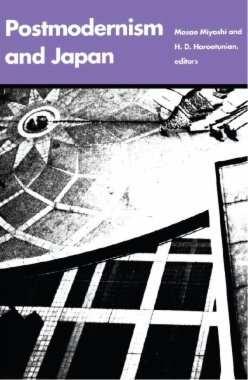Postmodernism and Japan is a coherent yet diverse study of the dynamics of postmodernism, as described by Lyotard, Baudrillard, Deleuze, and Guatarri, from the often startling perspective of a society bent on transforming itself into the image of Western “enlightenment” wealth and power. This work provides a unique view of a society in transition and confronting, like its models in the West, the problems induced by the introduction of new forms of knowledge, modes of production, and social relationships.
- Contents
- Introduction
- Note on Japanese Names
- On Culture and Technology in Postmodern Japan
- Critical Texts, Mass Artifacts: The Consumption of Knowledge in Postmodern Japan
- Of City, Nation, and Style
- Visible Discourses/Invisible Ideologies
- Modernity and Its Critique: The Problem of Universalism and Particularlism
- Maruyama Masao and the Incomplete Project of Modernity
- Against the Native Grain: The Japanese Novel and the “Postmodern” West
- Somehow: The Postmodern as Atmosphere
- Japan’s Dual Identity: A Writer’s Dilemma
- Suicide and the Japanese Postmodern: A Postnarrative Paradigm?
- Karatani Kojin’s Origins of Modern Japanese Literature
- One Spirit, Two Nineteenth Centuries
- Infantile Capitalism and Japan’s Postmodernism: A Fairy Tale
- Picturing Japan: Reflections on the Workshop
- Glossary
- Notes on Contributors
- Index

